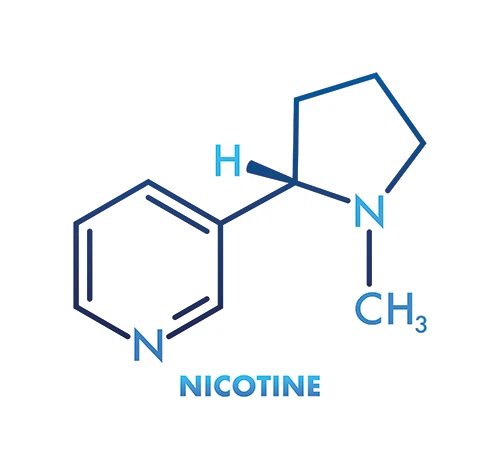Key Takeaways
- Nicotine is classed as an alkaloid. It occurs naturally in the leaves of several different plants from the nightshade family, including eggplant, tomato, as well as tobacco plants.
- Tobacco and nicotine have been used for purposes other than smoking for centuries. It has been employed as a natural pesticide, used in dubious medicines, and even as a way to revive drowning victims.
- Modern studies are investigating the potential for nicotine to be used to suppress appetite, reduce the effects of Parkinson’s Disease, improve attention span in ADHD sufferers, and treat some cases of schizophrenia.
- Nicotine is highly addictive and a poison. It is very easily spread around the body and has the potential to adversely affect almost every part of your body, from your brain and heart to your stomach and joints.
Nicotine is the best-known, and possibly most misunderstood, component of tobacco products like cigarettes and cigars. Nicotine is the element in tobacco that makes it so hard to stop smoking, but it isn’t the one that causes the most harm; not even close.
After many years of studies into the effects of nicotine, it is now being looked at in a more positive light. The most recent studies have shown potentially exciting results in areas like improvement of cognitive function, fat burning, memory loss, and even in life-changing ailments such as Parkinson’s disease and schizophrenia.
This drive to better understand the benefits of nicotine could be due, at least partly, to the rise in vaping. Even a few decades ago, the only realistic option for consuming nicotine was through smoking, where the bad would always outweigh the good. But with the rise of vaping, there is now a renewed interest in understanding what effects a cleaner nicotine product could have on us all.
In this article, we’ll take a look at some of the possible ways in which nicotine could be used to improve people’s health.

What is Nicotine?
Nicotine is a naturally occurring alkaloid found in several members of the nightshade family of plants, which includes eggplant, tomato, peppers, and tobacco plants. It is a poison produced by the plant to deter insects from eating its leaves.
In fact, when tobacco was first brought to Europe, it was often used as a natural pesticide to protect food crops.
Nicotine is also highly addictive and this is one of the main reasons why giving up smoking is so difficult. When nicotine reaches the brain, it stimulates the production of dopamine, a chemical that is responsible for feelings of satisfaction, pleasure, and motivation.
When you stop smoking, dopamine levels reduce, your mood lowers, and the desire for more nicotine kicks in. Repeated use of nicotine solidifies this feedback loop and results in addiction.

A Brief History of Tobacco and Nicotine Use as Medicine
After Christopher Columbus first observed the tobacco plant being used by indigenous tribes in the Americas, it was taken back to Europe where it was considered a very beneficial herb.
It was often given the nicknames ‘Gods Herb’ and ‘Holy Remedy’ and was added to many herbal oils, pastes, and medicines available at that time.
Books published in the 1530s reported eyewitness accounts of this new herb being used to treat cuts and bruises, colds, catarrh, and fever, as well as an aid to digestion, a hunger suppressant, and a narcotic.
There is also a report from later in the same century of a cook who nearly cut off his thumb, had it bound in tobacco leaves, and recovered fully. During the 1665 plague outbreak in London, children were instructed to smoke tobacco in their classrooms to stay healthy.
In the 18th century, doctors had begun to mistrust tobacco as a medicine, yet it could still be found on pharmacy shelves. It was regularly recommended as a treatment for earache (by blowing smoke strongly into the ear) and piles or hemorrhoids.
Bizarrely, tobacco smoke blown into a patient’s rectum was advocated as a cure for such serious conditions as strychnine poisoning, hernias, tetanus, ringworm, and even drowning.
After nicotine was isolated from tobacco plants in 1828, this new chemical began to be used on its own. It was often used in a salve to treat scabies, as well as in oils designed to treat other skin conditions.
Nicotine was thought to be the only beneficial alkaloid found in tobacco, and in the early 20th century it was suggested as a treatment for Cholera and some types of Parkinson’s Disease.

Potential Health Benefits of Nicotine
Nicotine certainly has the potential to do harm, especially to the still-developing brains of young people, but it also has the potential to do good. Here are a few ways in which nicotine has been observed to have potential benefits.
Increased Fat Burning/Weight Loss
Smoking and the nicotine derived from cigarettes have long been associated with weight loss. The gaining of weight through increased appetite when you quit smoking is commonly reported as a side effect and is likely a factor that makes it a less appealing choice for some people.
Several studies over the past few years have shown that nicotine not only suppresses appetite in many people, but also has the potential to actually speed up how quickly our bodies burn fat. It is thought to raise the resting metabolic rate in some people, which is the rate at which our bodies burn calories at rest, by around 10%.
That might not sound like much, but for the average person, a 10% increase in resting metabolic rate could result in as much as 10kg of extra fat being burned over a year.
Reduced Effects of Parkinson’s Disease
As many as 1 million people currently live with Parkinson’s Disease in the United States. That’s already a huge number, but this number is expected to rise to 1.2 million by 2030. Anything that can reduce that figure, or provide a better quality of life to those living with Parkinson’s, has got to be a good thing. Studies are beginning to show that nicotine could be part of the solution.
Nicotine binds to several different receptors in the brain. In particular, to the nicotinic acetylcholine receptors that are partly responsible for the production of serotonin, endorphins, dopamine, and several other neurotransmitters. Aside from producing pleasurable effects, these neurotransmitters can also prevent or reduce involuntary muscle movements. This is the effect of most interest to Parkinson’s Disease researchers.
This isn’t a new idea either. It has long been known that smokers are less likely to develop this life-changing disease. Further studies have shown that less harmful nicotine products, such as Snus (oral tobacco pouches) can also provide the same benefits.
More study and research are needed, but of all the potential benefits of nicotine, this one is perhaps the most impressive and could improve the lives of millions of people.
Improved Attention Span
Nicotine is quite a strange chemical. It can have both a stimulating and a relaxing effect on users, which seem to be at complete odds with each other. If that wasn’t strange enough, nicotine is also known to improve attention span, another seemingly incompatible effect.
Studies have been conducted on smokers and on healthy non-smokers to test the effect of nicotine on attention span. The results haven’t been quite as conclusive on the non-smokers, but improvements in certain cognitive functions were seen.
Nicotine even has the potential to be used to treat ADHD. A 2004 study suggests that nicotine applied in patches had a calming effect on patients that is at least comparable to Ritalin, one of the most commonly used ADHD medicines.
Science is still in debate over precisely how attention is controlled in the brain, so there is certainly more work to do. But with an estimated 8 million Americans thought to be affected by attention deficit disorders, this is another potential health benefit of nicotine that needs immediate and serious consideration.
Reduced Abnormal Brain Activity in Schizophrenics
More than 40 studies conducted by researchers all around the world have shown that people diagnosed with schizophrenia are much more likely to be smokers. It is thought that as many as 90 percent of schizophrenics smoke, compared to 11-15 percent of the general population in most developed countries.
Studies into why this is the case are beginning to back up the idea that smoking, and specifically nicotine in cigarettes, is used as a form of beneficial self-medication. A 2017 study at the Pasteur Institute in Paris has shown that nicotine can potentially normalize hypofrontality in mice. Hypofrontality is the decreased blood flow to the prefrontal cortex of the brain, a state associated with schizophrenia and several other neurological conditions.
“Chronic nicotine administration reversed this hypofrontality, suggesting that administration of nicotine may represent a therapeutic strategy for the treatment of schizophrenia and a physiological basis for the tendency of patients with schizophrenia to self-medicate by smoking.”
Improved Short-term Memory
At this point in our list, the potential benefits of nicotine on brain function might seem to be a given. We’ve already looked at studies that suggest that it could be useful for treating Parkinson’s disease, schizophrenia, ADHD, and other attention disorders. Why not add short-term memory to the list?
A study by the University of Surry in the UK, which gave participants either 0mg or 2mg of nicotine in chewing gum, showed that those who didn’t receive the placebo scored significantly better at information retention than those who did. A second study in 2018 provided similar results, with the authors stating:
“Nicotine had significant positive effects on fine motor, short-term episodic memory, and working memory performance.”
Adverse Side-effects of Nicotine
While it is true that nicotine has the potential to be much more beneficial to health than many people realize, it is also worth considering the adverse side effects of putting this addictive chemical into our bodies.
Nicotine is very easily spread around the body and can affect almost every part of you, from your brain and heart, to your stomach and joints. Some of the known adverse side effects of nicotine include:
- dizziness and lightheadedness
- sleep disturbances
- changes in blood flow
- headaches
- increased risk of blood clotting
- increased blood pressure
- changes in heart rhythm and rate
- shortness of breath
- peptic ulcer
- diarrhea
- nausea
- dry mouth
- tremors
- joint pain
- indigestion or heartburn
The bottom line
While nicotine has been observed to have potential benefits for a variety of ailments, conditions, and diseases, no medical professional would recommend ingesting nicotine as a medication through smoking, vaping, or any other recreational method, nor would our team here at Versed Vaper.
The benefits we have looked at here are based on clinical trials and medical studies, and a lot more research is needed. The future for nicotine as a medicine seems bright, but it’s important to remember that nicotine is addictive and, in very high doses, a harmful poison.
If you are not a smoker, it is not recommended to begin vaping. If you have one of the conditions listed in this article, we highly recommend speaking to your doctor or health professional before starting on any medication or treatment.










Add comment